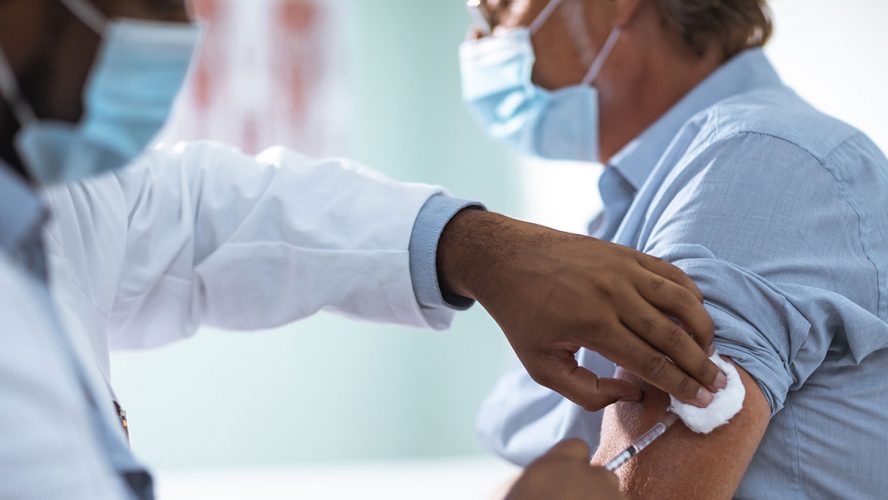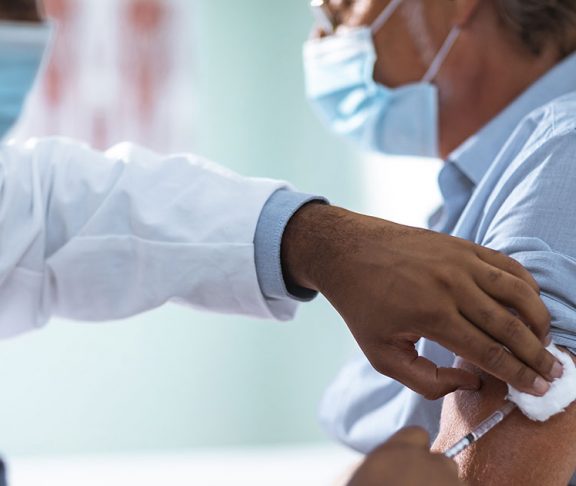More than half of all U.S. adults received at least the first dose of the COVID-19 vaccine by the end of April, but the fight against this virus — and its obstacles — is still not over. Through its MyIR Mobile app, STCHealth can help you keep track of your immunization history and prepare for a future where vaccines will be top of mind.
Three COVID-19 vaccines (made by Pfizer-BioNTech, Moderna, and Johnson & Johnson) are available for all U.S. adults to receive, and three are in Phase 3 clinical trials. These vaccines have been proven effective for reducing contraction and transmission of COVID-19, which means all people 16+ should sign up for and receive their vaccine as soon as possible.
However, just because you — and many more in your community — are vaccinated, that doesn’t mean it’s quite time to fully return to how things were pre-pandemic.
“In the immediate term, we still need to maintain all of these non-pharmaceutical public health interventions — wearing masks and distancing when we can,” said Dr. Kyle Freese, Ph.D., M.P.H., chief epidemiologist for STCHealth, a team of public health professionals working to connect and improve the healthcare ecosystem. “And the reason for that is because even though these vaccines are very, very effective, we’re still learning exactly what that immunity means.”
With a ways to go before the country and world reach sufficient immunity, the virus can still replicate, mutate, and form more dangerous and contagious variants.
“Viruses will replicate and mutate, but they are only able to do that if they have hosts in which to infect,” Freese said. “So, we’ll have fewer variants over the long term, if we get people vaccinated quickly.”
As for the future of COVID-19 and the vaccines used to protect against it, details continue to emerge.
It wasn’t until mid-April that Pfizer’s CEO Albert Bourla announced that COVID-19 vaccines will likely require annual boosters to remain effective. At the same time, Moderna’s CEO Stéphane Bancel said the company was studying an upgraded version of its vaccine designed to protect against the South African variant, and that it was working to create an annual booster vaccine that would also immunize against the flu.
On the record
Getting vaccinated and keeping track of your immunization history are now critical steps for returning to life as it was before the pandemic.
In New York, Gov. Andrew Cuomo has announced the launch of Excelsior Pass, which will allow entertainment venues to verify guests have received the COVID-19 vaccine (or a negative COVID test) before admitting them. In other areas, some businesses and universities are entertaining the idea of requiring patrons to keep and present vaccine passports to confirm they are properly immunized.
To help prepare for this future where vaccines are always top of mind, STCHealth has made it easier than ever to keep track of your immunization history via its MyIR Mobile app. Through partnerships with state and local health departments, MyIR Mobile makes it possible to access your immunization records wherever you go.
In addition to keeping track of the immunizations you’ve received, the app also tells you when you’re due for boosters and other shots, helping you take charge of your own health as you navigate the healthcare system.
“The consumer’s ability to have access to those records, and not only that, but have a system that helps remind them of when they’re due for vaccinations, I think is really important,” Freese said, “because immunization is one of the greatest public health tools we have, alongside sanitation and clean water.”
Overcoming hesitancy
Some of the key battles public health groups, like STChealth, are fighting today include reducing vaccine hesitancy and doubt about immunizations. According to a poll of over 1,500 U.S. adults ages 50-80 taken in late 2020, 46 percent said they would like to get the vaccine, but wanted to wait for others to receive it first, and 34 percent said they were either unsure about getting it or didn’t want it.
As Freese points out, dissent against vaccinations mostly exists because it can be hard to see the amazing things vaccines have done over the past 200+ years.
“Humans have a short memory for horrendous things,” he said. “With vaccines, we’ve essentially eliminated the burden of infectious disease on our communities, but if we don’t see something, it’s easy to forget about it.”
In short, the best thing you can do to improve the health of your community and put the world on the fasttrack back to normalcy is to get your shot.
“If you’re protected, you’re protecting everybody around you,” said Mike Popovich, CEO of STCHealth. “Your own social network is being protected if you’re doing the right thing.”You can visit myirmobile.com, and in just a few minutes get access to your entire immunization history


